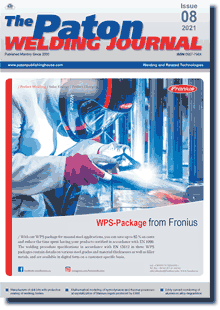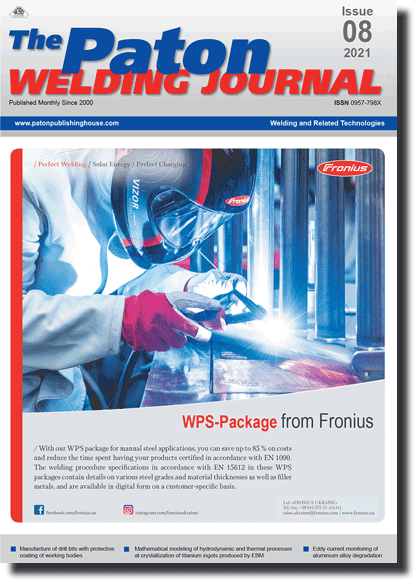| 2021 №08 (01) |
DOI of Article 10.37434/tpwj2021.08.02 |
2021 №08 (03) |

The Paton Welding Journal, 2021, #8, 8-10 pages
Development of technology for surfacing working layer of variable composition on crimping rolls
L.K. Leshchynskyi, V.P. Ivanov, V.M. Matviienko, K.K. Stepnov and E.I. Vozyanov
State Higher Education Institute «Pryazovskyi State Technical University» 7 Universytetska Str., 87555, Mariupol, Ukraine.
Abstract
It is shown that development of the technology for surfacing crimping rolls with the working layer of variable composition and mechanical properties along the body length makes it possible to minimize the unevenness of wear, especially in the area with its greatest depth. Application of this technology involves the use of a control system that provides separate control of the feed drive for each of the electrodes. It is shown that during surfacing of the crimping rolls with a layer of variable composition of the C‒Cr‒Mo‒V alloying system, it is advisable to limit the content of elements within the ranges of 15Kh3GSMF – 24Kh4MFBS. It was demonstrated that the technology of surfacing crimping rolls with the working layer of variable composition is realized by feeding two strip electrodes LN-15Kh3GSMF and LN-24KhMFBS into the common weld pool. It was found that to obtain the required law of the change of the layer composition along the body length, the ratio of feed rates of the strip electrodes is changed in accordance with the carbon equivalent value of the metal of strip electrodes. It is shown that during operation of horizontal rolls of the slabbing mill, surfaced with a layer of variable composition, the unevenness of body wear decreases, and the operating time of rolls per 1 mm of wear of the working layer also increases. 9 Ref., 3 Tables, 2 Figures.
Keywords: surfacing, working layer, variable chemical composition, carbon equivalent, strip electrodes, crimping roll, uneven wear, law of hardness change
Received 01.07.2021
References
1. Ryabtsev, I.A., Kondratiev, I.A., Vasiliev, V.G. et al. (2010) Investigation of structure and service properties of deposited metal for reconditioning and strengthening of rolling mill rolls. The Paton Welding J., 7, 12–15.2. Ryabtsev, I.A., Babinets, A.A., Gordan, G.N. et al. (2013) Structure of multilayer samples, simulating surfaced tools for hot deforming of metals. Ibid., 9, 41–45.
3. Matvienkov, S.A., Shebanits, E.N., Murashkin, A.V. et al. (2012) Surfacing of working and backup rolls using the ceramic flux I-KF-45-65 at MMK im. Ilyicha. Metall i Litio Ukrainy, 2, 50–54 [in Russian].
4. Ivanov, V.P., Leshchynskyi, L.K., Shcherbakov, S.V. (2019) Modeling the technology of deposition of a layer of variable chemical composition. The Paton Welding J., 11, 33-37. https://doi.org/10.15407/tpwj2019.11.06
5. Corbett, R. (1990) Rolls for metalworking industries. Warrendale, Iron & Steel Society.
6. Ryabtsev, I.A., Senchenkov, I.K. (2013) Theory and practice of surfacing works. Kiev, Ekotekhnologiya [in Russian].
7. Samotugin, S.S., Lavrik, V.P., Leshchinskyi, L.K., Solyanik, N.H. (2001) Plasma treatment of sparcely-alloyed heat-resistant deposited metal. Problemy Spets. Elektrometallurgii, 2, 26–31 [in Russian].
8. Leshchinskiy, L.K., Ivanov, V.P., Маslov, А.А. at al. (1997) Electrode strip for surfacing. Pat. 2087589 RU, Int. Cl. В23К020/227 [in Russian].
9. Boiko, V.S., Stepnov, K.K., Shebanits, E.M. et al. (2003) Electrode strip for surfacing. Pat. 62591 UA, Int. Cl. В23К 35/00 [in Ukrainian].
Suggested Citation
L.K. Leshchynskyi, V.P. Ivanov, V.M. Matviienko, K.K. Stepnov and E.I. Vozyanov (2021) Development of technology for surfacing working layer of variable composition on crimping rolls. The Paton Welding J., 08, 8-10.The cost of subscription/purchase order journals or individual articles
| Journal/Currency | Annual Set | 1 issue printed |
1 issue |
one article |
| TPWJ/USD | 384 $ | 32 $ | 26 $ | 13 $ |
| TPWJ/EUR | 348 € | 29 € | 24 € | 12 € |
| TPWJ/UAH | 7200 UAH | 600 UAH | 600 UAH | 280 UAH |
| AS/UAH | 1800 UAH | 300 UAH | 300 UAH | 150 UAH |
| AS/USD | 192 $ | 32 $ | 26 $ | 13 $ |
| AS/EUR | 180 € | 30 € | 25 € | 12 € |
| SEM/UAH | 1200 UAH | 300 UAH | 300 UAH | 150 UAH |
| SEM/USD | 128 $ | 32 $ | 26 $ | 13 $ |
| SEM/EUR | 120 € | 30 € | 25 € | 12 € |
| TDNK/UAH | 1200 UAH | 300 UAH | 300 UAH | 150 UAH |
| TDNK/USD | 128 $ | 32 $ | 26 $ | 13 $ |
| TDNK/EUR | 120 € | 30 € | 25 € | 15 € |
AS = «Automatic Welding» - 6 issues per year;
TPWJ = «PATON WELDING JOURNAL» - 12 issues per year;
SEM = «Electrometallurgy Today» - 4 issues per year;
TDNK = «Technical Diagnostics and Non-Destructive Testing» - 4 issues per year.


